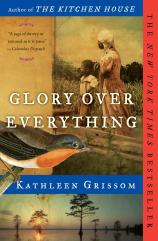Reading Group Guide
Discussion Questions
Glory Over Everything

Introduction
In the follow-up to her beloved novel, THE KITCHEN HOUSE, Kathleen Grissom returns to the riveting story of Jamie Pyke, the son of a black slave and a white plantation owner forced to flee his Virginia home to avoid being sold as a slave. GLORY OVER EVERYTHING opens in Philadelphia in 1830, where Jamie now passes as the white Mr. James Burton, an artist and silversmith of renown. But when his lover, Caroline, finds herself pregnant, James fears that his years of deception will unravel with the birth of their child. In the meantime, James learns that slave catchers have abducted his young servant, Pan, the only son of Henry, the fugitive slave responsible for James’s safe passage to Philadelphia years before. Aware of his debt to Henry, and mourning Caroline’s tragic death in childbirth, James undertakes an odyssey to North Carolina to rescue Pan. With help from Sukey, a former Tall Oaks slave, and a series of Underground Railroad sympathizers, James must face up to his true identity and some of his greatest fears.
Topics & Questions for Discussion
1. “I had met Henry twenty years earlier, when, at the age of thirteen, I arrived in Philadelphia, ill and terrified and fleeing for my life.” How does James’s flight from Tall Oaks mark his life going forward? Why does Henry come to James’s aid, and what does he represent to James? What details from their early interactions complicate their relationship as adults?
2. “I had never and would never consider myself a Negro. In fact, the idea disgusted me.” How does James reconcile his biracial identity with his own racist attitudes? To what extent does his denial of his ethnicity serve as a means of self-preservation in the racist society he inhabits?
3. Why does Pan’s unexplained disappearance distress James? Compare and contrast the dangers from slave catchers that Pan and James face. Why do you think Kathleen Grissom chose to alternate these characters’ narratives at key points in the novel?
4. Why does James conceal his biracial status from Caroline Preston, the married daughter of socially prominent Philadelphia aristocrats? How does her pregnancy threaten James’s entire existence? How might Caroline’s discovery of his biracial status have altered the trajectory of the novel? Why do you think Kathleen Grissom chose not to pursue that storyline?
5. “‘I can provide [room and board] for you in my home, where you will be downstairs with our household help.’” As a newly minted apprentice at Burton’s Silversmith, why does James feel insulted to live below stairs with the black servants? How do Delia, Ed and Robert react to having a white person living with them?
6. Describe James’s relationship with Mrs. Burton. What role does the bird Malcolm play in their bond? How is their connection strengthened by the tragedies they have experienced? How does James’s discovery of the Burtons’ views on slavery affect him?
7. From the reactions of his white and black acquaintances, how convincing are James’s efforts to pass as a white silversmith in Philadelphia? What does Delia’s theft of James’s letter in the aftermath of his adoption by the Burtons suggest about her intentions? What reasons might Delia have for outing James?
8. “I had loved [Mrs. Burton] as a mother…. A difference existed after she learned the truth from Delia. Yet I did not hold her responsible; for how could I blame her for an inability to love the part of me that I, too, loathed.” How does Delia’s revelation of James’s race affect his relationship with his Mrs. Burton? What does her dismissal of Delia imply about her acceptance of James?
9. James refers to his attraction to Caroline Preston as an “uncomfortable fascination.” How does Caroline characterize her feelings for James? Given their differences in age and social class, what explains their connection? To what extent is Caroline’s mother, Cristina Cardon, an enabler of their illicit affair?
10. Discuss the remarkable events that converge to liberate Pan from the Southwood plantation. What does the collaboration of Sukey and the Spencer family in the daring rescue suggest about the racially progressive views of many white Americans during this era? Given the unique dangers James faces in his efforts to retrieve Pan from the plantation’s overseer, Bill Thomas, why does he persist?
11. “From above, thick corded vines netted with Spanish moss draped down to ensnare us. With each vine I pushed away I thought of cottonmouth moccasins, the copperheads, and the rattlesnakes that were known to inhabit the place.” What does the Great Dismal Swamp represent to runaway slaves and their pursuers? Why do the runaways seek refuge there, despite the many dangers? Why does the Spencer family, along with many others, fear it?
12. Why does Sukey’s delivery of her baby in a cave in the Great Dismal Swamp cause James to panic and flee? How does Pan respond to James’s act of cowardice? To what extent does James redeem himself in Pan’s eyes through his treatment of Sukey’s infant daughter, Kitty?
13. “Where, then, did I belong? Was my birth an accident of fate, or was my life intended to have some purpose?” How do the circumstances of James’s birth and upbringing shape his sense of self at the beginning of the novel? By the end, what events have enabled his new understanding and acceptance of himself?
14. How does Kathleen Grissom’s use of multiple narrators deepen your appreciation of the work? If the author had chosen to include other characters’ perspectives, whose would you have been especially interested to read, and why?
15. In James’s last letter to his mother, Belle, he reveals his decision to change his daughter’s name from Caroline to Belle. What role does his servant Robert play in the radical transformation of James’s feelings for his mother? Discuss how the conclusion of the novel brings the arc of James’s character full circle.
Enhance Your Book Club
1. Ask members of your club to consider the social and political causes that are most important to them. How willing would they be to risk their lives to improve the lives of total strangers? Consider what leading a double life as a secret member of the Underground Railroad would have been like in nineteenth-century America.
2. GLORY OVER EVERYTHING confronts many serious questions of race and prejudice. Compare the state of race relations in the 19th century with those of the present day. To what extent does racial prejudice persist in our country? How does James’s anxiety as a biracial person passing as white compare to the concerns of a person of mixed race in America today? Consider the case of Rachel Dolezal, a white woman who claimed to be and passed as African-American.
3. Toward the end of GLORY OVER EVERYTHING, James undergoes an epiphany in his thoughts about race, himself and his role in the world. Ask members of your group whether or not they have ever experienced epiphanies relating to their personal identities, faith, careers or relationships. If they have, discuss what spurred these realizations. How did these epiphanies enable them to change or refocus their lives?
Glory Over Everything
- Publication Date: February 21, 2017
- Genres: Fiction, Historical Fiction
- Paperback: 400 pages
- Publisher: Touchstone
- ISBN-10: 1476748454
- ISBN-13: 9781476748450








